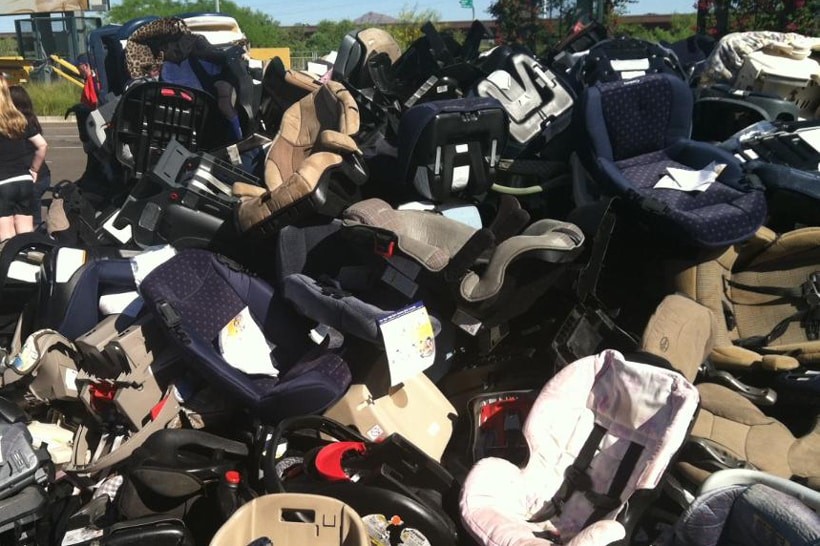Millions of car seats end up in landfills every year, contributing to environmental waste. As responsible parents and caregivers, we’re legally obligated to use car seats to protect our children while traveling. With approximately 4 million babies born annually and kids using car seats in various forms until they are at least 8 years old, the sheer volume of car seats in circulation is enormous. Eventually, these seats become obsolete due to expiration, being outgrown, or damage from accidents. So, what’s the responsible way to handle these bulky items once they’ve served their purpose? Let’s explore How To Get Rid Of Car Seats in an environmentally conscious way.
The Problem with Discarded Car Seats
When car seats are simply thrown away, they pose several problems:
- Landfill Overload: Car seats are made of durable plastics, foams, and metal parts that don’t easily decompose. This means they take up significant space in landfills for decades.
-
Expiration and Degradation: Car seats are exposed to extreme temperatures and UV radiation, causing the plastic to degrade over time. This is why car seats have expiration dates, usually found on a label or stamped into the plastic. Expired car seats may not provide the necessary protection in a crash.
-
Crash Damage: After a car accident, even if it seems minor, car seats should often be replaced. The structural integrity designed to protect a child can be compromised during a crash, weakening its safety performance in future incidents.
-
Unsafe Reuse: Discarding car seats in trash cans or garage sales can lead to unsafe reuse. People may unknowingly pick up expired, damaged, or recalled seats, putting children at risk.
Recycling Car Seats: A Better Solution
Angelica M. Baker, a Child Passenger Safety Specialist at Phoenix Children’s Hospital, emphasizes that recycling and de-manufacturing are the proper ways to dispose of car seats, not garage sales or trash cans. Dismantling car seats takes a bit of effort, but it’s a worthwhile step to prevent unsafe seats from being reused and to reduce environmental impact.
Years ago, May Romo from Safe Kids Salt Lake County highlighted the importance of car seat recycling, a philosophy that resonates with organizations like Safe Ride 4 Kids. While specific programs mentioned in the past may no longer be active, the core principle of keeping reusable materials out of landfills remains crucial.
Finding Local Car Seat Recycling Programs
Many communities are recognizing the need for car seat recycling and are establishing dedicated programs.
-
Department of Transportation Programs: In some states, like Colorado, the Department of Transportation offers car seat recycling programs. These programs often have designated drop-off locations for old, expired, or damaged car seats. Check your state’s DOT website to see if a similar program exists in your area.
-
Recycle Your Car Seat Website: Websites like RecycleYourCarSeat.org maintain lists of recycling programs across various states. If your state isn’t listed, online searches using terms like “car seat recycling near me” can help you find local initiatives.
Car Seat Trade-in Events
Big-box retailers have stepped up to provide convenient car seat disposal options through trade-in programs.
-
Target: Target has a long-standing car seat trade-in program, often held twice a year, usually around Earth Day in April and during Child Passenger Safety Week in September. Customers who bring in old car seats receive a 20% discount coupon for baby gear. Target partners with Waste Management to ensure the collected car seats are recycled and repurposed into new products. Keep an eye out for announcements, Target’s next event is April 14-27, 2024.
-
Walmart: Walmart initiated a car seat recycling program in 2019 in collaboration with TerraCycle. Participants receive a $30 gift card for recycling their old car seats at participating locations. Check Walmart’s website or local store for upcoming events.
-
Car Seat Manufacturers: Some car seat manufacturers also offer recycling programs. Contact the manufacturer of your car seat to inquire about their recycling initiatives. Clek, for example, offers a year-round recycling program for any brand of car seat. They provide a recycling kit that can be shipped via UPS, though a small fee applies to cover shipping and processing.
Reusing and Repurposing Options
-
Donation (if appropriate): If your car seat is unexpired, hasn’t been recalled or involved in a crash, and meets current safety standards, consider donating it to a local charity. Hospitals or organizations supporting low-income families may accept car seat donations. However, it’s crucial to ensure the seat is safe and has a significant lifespan remaining.
-
Resale (with caution): While buying used car seats is generally not recommended due to unknown history and potential safety concerns, some platforms like Good Buy Gear facilitate the resale of gently used car seats. If considering this, ensure you are fully transparent about the seat’s history and condition.
DIY Car Seat Dismantling and Recycling
If no local recycling programs are accessible or trade-in events are not available, you can take a DIY approach to responsibly dispose of your car seat:
-
Dismantle: Carefully take apart the car seat, separating the different materials.
-
Separate Materials: Divide the components into plastic, metal, fabric, and foam.
-
Recycle Plastics and Metals: Check your local recycling guidelines and recycle any plastic and metal parts that are accepted.
-
Reuse or Compost Fabrics: Consider repurposing the fabric for craft projects or, if possible, composting natural fibers at a suitable facility.
By taking these steps, you can significantly reduce the environmental impact of discarded car seats.
Do you know of other car seat recycling programs? Share them in the comments below to help others find sustainable disposal options in their communities.
By Amie Durocher, Creative Director at Safe Ride 4 Kids and certified CPS Tech since 2004
Copyright 2024 Safe Ride 4 Kids. All rights reserved.

